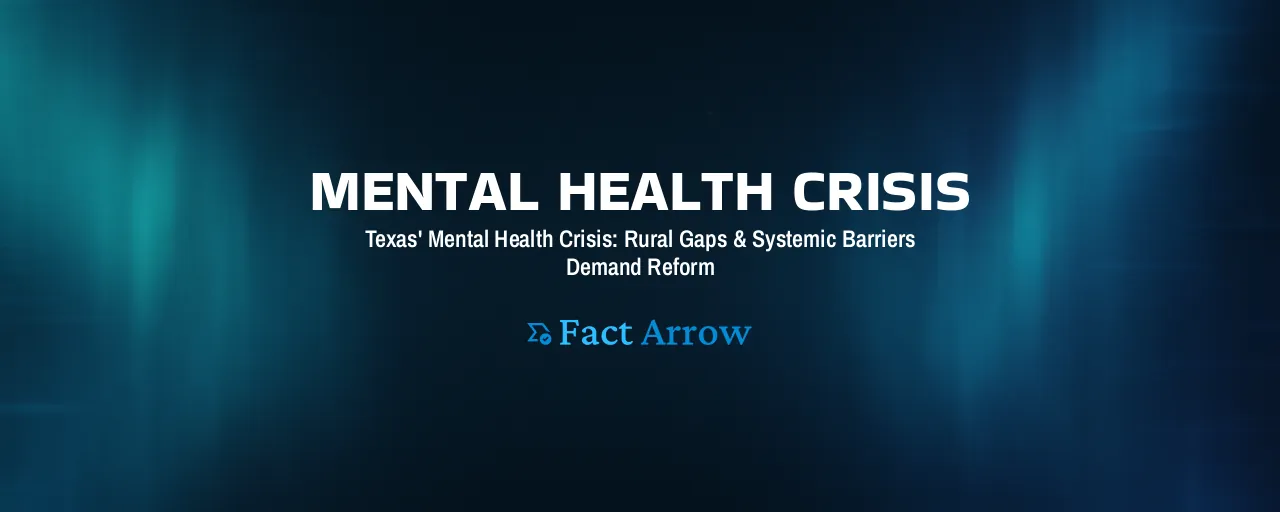A Glimmer of Hope in Amarillo
Today, Texas took a step toward addressing its mental health crisis with the groundbreaking of the Panhandle State Hospital in Amarillo. This 75-bed facility, backed by $159 million in state funding, will bring much-needed psychiatric care to a region where access has been nearly nonexistent. By 2027, adults in the 26-county Panhandle will have a local option for inpatient treatment. This matters in a place where the nearest help is often hours away.
Yet, as welcome as this hospital is, it feels like a single raindrop in a drought. Rural Texans have endured decades of neglect in mental health care, facing provider shortages, stigma, and systemic barriers that no single facility can dismantle. The excitement over this project is real, yet frustration persists because it is only a piece of what is needed. True reform requires a broader vision.
This hospital represents progress, and it also highlights how far we have to go. Why are we still playing catch-up when we could be preventing crises? The answer lies in priorities, and Texas has a chance to rethink them.
The Rural Struggle Persists
In rural America, mental health care is a luxury for too many. With just 3.5 psychiatrists per 100,000 people compared to 13 in cities, places like the Panhandle are critically underserved. Nearly 70 percent of rural counties lack a single psychiatrist, and long drives, limited transit, and stigma keep people from seeking help. The Health Resources and Services Administration flags nearly 3,900 rural areas needing over 1,600 more providers. While a 75-bed hospital offers some help, it does not provide a complete solution.
Texas has invested $2.5 billion since 2017 to modernize its state hospitals, adding over 500 beds and easing forensic wait times. Projects in Lubbock, Terrell, and now Amarillo show commitment to infrastructure. However, buildings alone do not solve the provider shortage or reach people before they need hospitalization. Community clinics and telehealth could bridge that gap; they remain underfunded.
Policymakers prioritizing fiscal discipline argue these state-led efforts balance local needs with fiscal discipline. That perspective misses the mark when gaps in care persist. Expanding Medicaid or investing in workforce training would reach more people, faster. Why settle for incremental gains when bolder solutions are within reach?
When Jails Become Treatment Centers
The intersection of mental health and justice reveals a heartbreaking failure. Over 1.2 million people with mental illnesses are incarcerated annually in the U.S., many because community care is not available. In Texas, forensic bed waitlists have stretched past a year in some counties, leaving over 2,300 people waiting in jails for competency restoration. While the new hospital's 75 beds will help, they will not close this gap.
Decades ago, deinstitutionalization emptied psychiatric hospitals, but community care never scaled up. Jails filled the void, becoming makeshift treatment centers for those society failed. Advocates point to crisis diversion and intercept programs as proven ways to keep people in treatment rather than in cells. Texas's focus on hospital beds over prevention feels like a misstep when we know early intervention works.
Some defend this approach, claiming hospitals are a practical investment. That view overlooks the human toll of a system that waits for crises to act. Every person stuck in jail instead of treatment deserves better. Prioritizing community-based care would save lives and resources—why are we not doing it?
Building a System That Works for All
Real mental health reform means care that is accessible, equitable, and proactive. Community clinics, telehealth networks, and Medicaid expansion could reach Texans before they are in crisis. Public campaigns to reduce stigma and training programs to grow the workforce would address root causes. States like California, with its $4.4 billion behavioral health push, and New York, with rural support teams, prove bold investments yield results.
The Panhandle State Hospital is a start, but it is not enough. Mental health care is a right, not a privilege reserved for those who can access it. Texas and federal leaders need to collaborate to fund community solutions and ensure no one is left behind. A system that lets people fall through the cracks is broken and unjust.
As Amarillo's hospital takes shape, let's demand more than new buildings. Let's fight for a future where every Texan can get help close to home, without barriers or delays. The path to mental health equity is long, but it is a journey we can not afford to abandon. Who will stand up for it?
